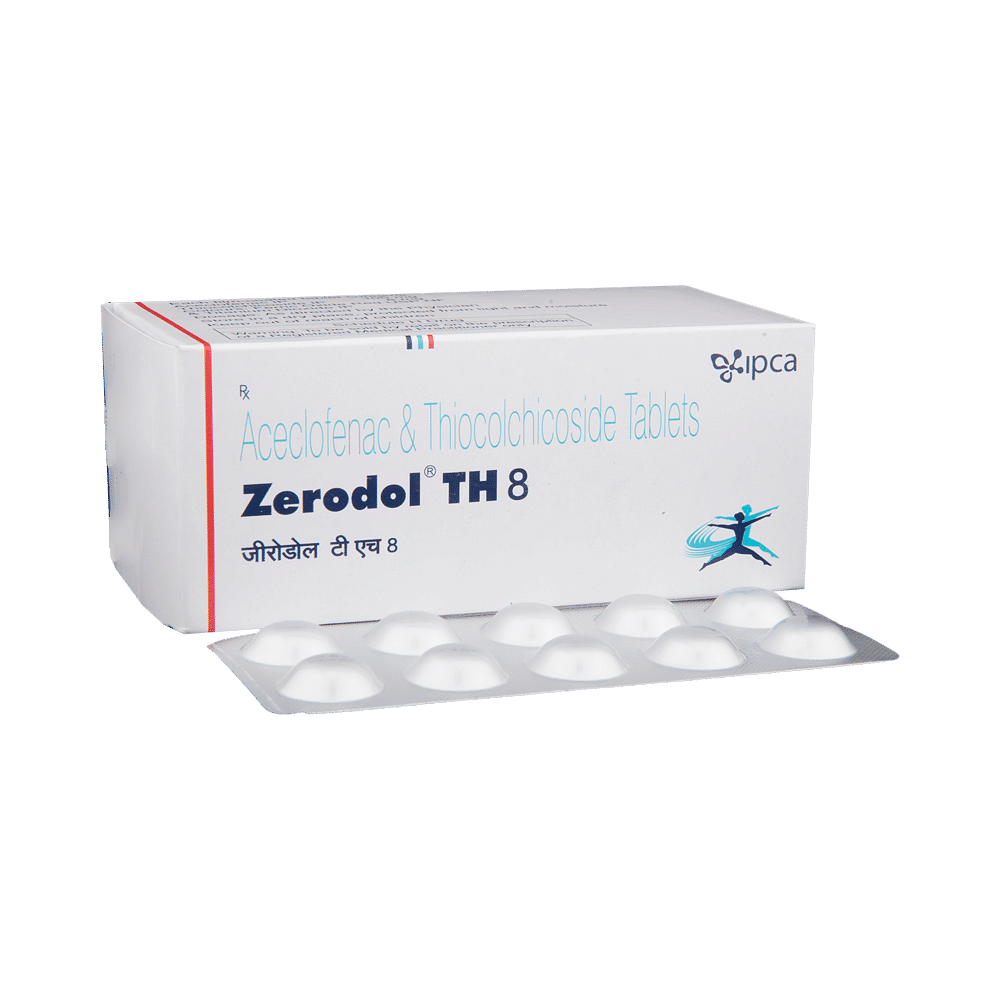
Thioford Forte Tablet 100mg/8mg
Manufacturer
Leeford Healthcare Ltd
Salt Composition
Aceclofenac (100mg) + Thiocolchicoside (8mg)
Key Information
Short Description
Thioford Forte Tablet 100mg/8mg is a combination medicine used in the treatment of pain due to muscle spasms.
Dosage Form
Tablet
Introduction
Thioford Forte Tablet 100mg/8mg should be taken with food. This will prevent you from getting an upset stomach. You should take it regularly as advised by your doctor. Do not take more or use it for a longer duration than recommended by your doctor. Some of the common side effects of this medicine include nausea, vomiting, heartburn, stomach pain, loss of appetite, and diarrhea. If any of these side effects bother you or do not go away with time, you should let your doctor know. Your doctor may help with ways to reduce or prevent these side effects.
Directions for Use
Take this medicine in the dose and duration as advised by your doctor. Swallow it as a whole. Do not chew, crush or break it. Thioford Forte Tablet 100mg/8mg is to be taken with food.
Safety Information
Side Effects
No common side effects listed.
Alcohol Warning
It is unsafe to consume alcohol with Thioford Forte Tablet 100mg/8mg.
Breastfeeding Warning
Information regarding the use of Thioford Forte Tablet 100mg/8mg during breastfeeding is not available. Please consult your doctor.
Pregnancy Warning
Thioford Forte Tablet 100mg/8mg may be unsafe to use during pregnancy. Although there are limited studies in humans, animal studies have shown harmful effects on the developing baby. Your doctor will weigh the benefits and any potential risks before prescribing it to you. Please consult your doctor.
How it works
Thioford Forte Tablet 100mg/8mg is a combination of two medicines: Aceclofenac and Thiocolchicoside which relieves pain and relaxes the muscles.
Quick Tips
Thioford Forte Tablet 100mg/8mg helps relieve pain and muscle spasm that may occur due to strains, sprains, and muscle injuries. It is usually used along with rest and physical therapy. Take it with food to avoid an upset stomach. It may cause dizziness. Do not drive or do anything requiring concentration until you know how it affects you. Avoid consuming alcohol when taking Thioford Forte Tablet 100mg/8mg as it may cause excessive drowsiness.
Related Medicines

Zerodol TH 8 Tablet

Myostat 100mg/8mg Tablet

Decomb T Tablet

Aclodac T 100mg/8mg Tablet

Thiocent DS 100mg/8mg Tablet

Nanofen MR 100mg/8mg Tablet

Flezox TH 100mg/8mg Tablet

Thysid A 100mg/8mg Tablet

Zycer T 100mg/8mg Tablet

Adact-A 8 Tablet
Frequently asked questions
What is Thioford Forte Tablet 100mg/8mg?
Thioford Forte Tablet 100mg/8mg is a prescription medication that combines two active ingredients: Aceclofenac and Thiocolchicoside. It is used to relieve muscle pain by acting on the central nervous system, reducing inflammation and pain in the body.
Is it safe to use Thioford Forte Tablet 100mg/8mg?
Thioford Forte Tablet 100mg/8mg is generally considered safe for most patients. However, as with any medication, some individuals may experience common side effects such as nausea, vomiting, stomach pain, heartburn, and diarrhea. In rare cases, it can also cause more severe side effects. If you experience persistent or severe symptoms, inform your doctor.
Can the Thioford Forte Tablet 100mg/8mg be stopped when my pain is relieved?
Thioford Forte Tablet 100mg/8mg is usually prescribed for a short duration and can be discontinued once the pain is relieved. However, it's essential to consult your doctor before stopping the medication, as they may advise you to continue using it if necessary.
Can the use of Thioford Forte Tablet 100mg/8mg cause dizziness?
Yes, some patients may experience dizziness or lightheadedness after taking Thioford Forte Tablet 100mg/8mg. If you feel dizzy, it's recommended to rest for a while and resume once you feel better.
Are there any specific contraindications associated with the use of Thioford Forte Tablet 100mg/8mg?
Thioford Forte Tablet 100mg/8mg is not suitable for patients with known allergies to painkillers or any components of this medication. It's also recommended to avoid using it in individuals with a history of stomach ulcers, active bleeding, heart failure, high blood pressure, liver disease, or kidney disease.
Can Thioford Forte Tablet 100mg/8mg be taken with Vitamin B-complex?
Yes, Thioford Forte Tablet 100mg/8mg can be used in conjunction with Vitamin B-complex preparations. While it helps relieve pain, Vitamin B-complex can help correct vitamin deficiencies that might be contributing to your symptoms.
Can the use of Thioford Forte Tablet 100mg/8mg cause damage to kidneys?
Long-term use of Thioford Forte Tablet 100mg/8mg may lead to kidney damage. This is because it can lower prostaglandin levels in the body, which helps protect the kidneys from damage. It's essential to consult your doctor before using this medication if you have existing kidney disease.
Will Thioford Forte Tablet 100mg/8mg be more effective if taken in higher doses?
No, taking higher doses of Thioford Forte Tablet 100mg/8mg will not make it more effective. In fact, it can increase the risk of side effects. If your symptoms persist or worsen, consult your doctor for re-evaluation and guidance.


